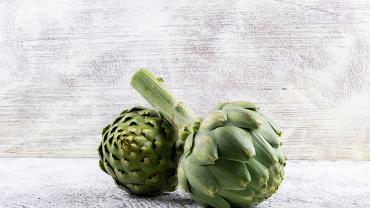
Artichokes have a long history of medicinal use, especially for the liver and for digestive health. The traditional use of artichoke leaf extract has been substantiated through recent research demonstrating the health benefits of artichokes, including blood sugar regulation, cholesterol metabolism, and liver health. The exact mechanisms for many of these properties remain under investigation, and many benefits may likely stem from the phytochemicals found in artichokes, including phenolic compounds and flavonoids, and prebiotic fiber, such as inulin.
These phytochemicals act as antioxidants, protecting against oxidative stress damage, and they exhibit antimicrobial and immunomodulatory effects. Artichokes also promote bile secretion and excretion, which aid in fat and fat-soluble vitamin digestion. Artichokes also help remove toxins, cholesterol, xenobiotics, and other metabolites. These functions combined provide liver support and protection, and promote normal body mass index (BMI), further reducing the risk of complications of obesity to the liver and other health aspects.
A high-fat diet, such as the Western-style diet, may damage the liver and lead to weight gain. According to a rat study, artichoke supplementation may help protect against and reverse these effects. This study compared the effects of two different doses of artichoke leaf with atorvastatin on rats consuming a high-fat diet, along with a control group on a standard diet. All the rats gained weight on the high-fat diet compared to the standard diet, and those in both artichoke groups experienced a significant reduction in weight gain. Both doses of artichoke and atorvastatin also significantly decreased the levels of lipase pancreatic activity by 56% and restored normal cholesterol levels. In addition, artichoke supplementation reversed the damage to the liver based on liver enzymes and the liver histoarchitecture, demonstrating a protective effect.
Artichokes can potentially protect the liver from damage and may help improve liver status in those individuals who already have liver damage. In one double-blind, randomized control trial, patients took 600 mg of dried artichoke leaf extract daily for 8 weeks. Patients in this study who had non-alcoholic fatty liver disease (NAFLD) experienced an improvement in liver health in both ultrasound parameters and serum markers, including alanine transaminase (ALT), aspartate aminotransferase (AST), and total bilirubin. The benefits went beyond liver function; the group taking the artichoke supplements also experienced a significant reduction in blood sugar levels, cholesterol, triglycerides, BMI, and waist circumference compared to the placebo.
The weight loss benefits have also been seen in studies that looked beyond liver function. In a double-blind, placebo-controlled clinical trial, patients with a BMI between 26 and 33, along with high blood pressure, were randomized to take either 1 gram of dried artichoke leaves or a placebo for 8 weeks. The artichoke group experienced a significant decrease in their weight and BMI, although there was no effect on blood pressure. The researchers postulated that the beneficial effects of the artichoke leaf extract were due to the prebiotic fibers, mainly inulin and oligofructose.
Along with diet and lifestyle changes, supportive herbs, such as the artichoke, may help promote normal body weight and support liver health, along with improving other risk factors for metabolic and cardiovascular diseases. Maintaining a healthy liver also aids in supporting the capacity for the body to detoxify environmental toxins, metabolic waste, heavy metals, and other xenobiotics.
By Kendra Whitmore, MS, CNS